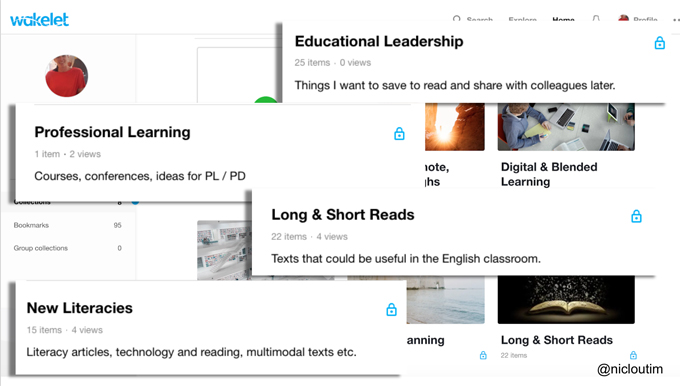
One of the great benefits of being future-focused educators is the ability to connect with fellow professionals and education networks on a wide range of digital platforms. In such places we acquire ideas and resources for our students, teaching, and professional learning. Yet, the sheer volume of potentially useful material we encounter as we scroll through these platforms is also one of its greatest challenges. On an average day, a connected literacy educator may encounter streams of potentially useful educational content such as TED talks, news articles, or videos which they may wish to save and use later. Consequently, it is worth sharing ideas for approaches to capturing and organizing such content, especially during the summer vacation when many educators are engaged in self-directed professional learning and preparing resources for the school year to come.
Although most digital platforms such as Twitter, YouTube, and TED have options for saving posts and resources, such an approach results in a series of disparate collections on multiple platforms, often leaving users wondering, Now, where did I save that? Managing and sharing digital resources is an expected skill of our contemporary world. Therefore, as educators and school leaders, we are called to model for our students and colleagues efficient and collaborative ways to do so. While there are many methods educators could use for this purpose, none seem as user-friendly and visually appealing as the digital curation tool provided by Wakelet.
Wakelet helps users to quickly store, organize, and share digital content that is relevant to them. Once a free account is set up, the user can curate collections to group together similarly themed digital resources, or find collections curated by other users. Collections can include a mix of weblinks, text, photos, videos, images and files, all of which are able to be titled, annotated and reordered. By downloading the app and adding the web browser extensions, saving digital content to a collection is a matter of a few quick clicks. Wakelet collections can be kept private or made public, are easily shared via a single URL. Additionally, the ability for users to collaborate on collections together amplifies the possibilities for use with students in the classroom.
Students could use Wakelet to track source material for an independent research task, or as a digital writing portfolio to showcase their best compositions with a college admissions office. Teachers could use the tool for group work requiring the curation of a themed collection (ie: concept, genre, writer), or to have a class co-construct a collection of book reviews and book trailers to inspire each other’s independent reading. School leaders might compile a resource list of educational research articles centered around the school’s professional development goals, or share a collection of resources to promote digital citizenship in the home with their parent community. Visit the Wakelet blog to read more about the ways educators are using this digital curation tool in the classroom.
Finally, given that it is currently summer break, let’s take a moment to consider the opportunity that digital curation provides to organize our lives for the better. Now you finally have a central place to save and share recipes, travel destinations, and reviews of all those films you’ve been meaning to see. Go forth and (digitally) curate!
Nicole Timbrell is the assistant head of secondary school at Australian International School in Singapore, where she also teaches English. Formerly, Nicole was a graduate student and a research assistant at the New Literacies Research Lab at the University of Connecticut. She has no affiliation with the Wakelet team. You can find her on Twitter at @nicloutim.
This article is part of a series from the International Literacy Association Technology in Literacy Education Special Interest Group (TILE-SIG).